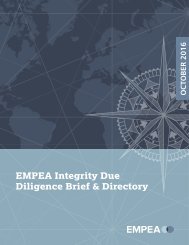Create successful ePaper yourself
Turn your PDF publications into a flip-book with our unique Google optimized e-Paper software.
The specialised services <strong>of</strong>fered by <strong>of</strong>fshore centres<br />
depend on a well-developed legal and regulatory<br />
environment, expertise (pr<strong>of</strong>essional, administrative and<br />
clerical); and, scale (i.e., returns from servicing a sizeable<br />
market). Onshoring such a service industry will require a<br />
huge effort and, even once successful, the specific services<br />
provided would serve only a narrow-base (predominantly<br />
accounting / taxation / legal / clerical services to the PE<br />
industry). Building trust in local capacity would be at best a<br />
medium-term endeavor. Altogether the development impact<br />
would take considerable time, require a concerted effort, be<br />
very costly to achieve, and be quite small.<br />
1.2 Onshoring Services Rather<br />
Than Centres<br />
The overwhelming challenges faced by countries wishing<br />
to onshore activities currently undertaken by <strong>of</strong>fshore<br />
centres taken together with the rather narrow nature <strong>of</strong><br />
the business being undertaken by these centres suggests<br />
that an alternative approach<br />
to onshoring might be<br />
more appropriate and<br />
contribute more significant<br />
development outcomes.<br />
The key challenge faced<br />
by investors in Africa is<br />
the lack <strong>of</strong> a pipeline <strong>of</strong><br />
viable, bankable projects,<br />
particularly in looking beyond<br />
the established cadre <strong>of</strong><br />
medium and large scale<br />
enterprises. Invariably<br />
investors are left chasing the<br />
rather small universe <strong>of</strong> more<br />
Source: EMPEA.<br />
well-established and larger<br />
companies. In the case <strong>of</strong> infrastructure, projects constraints<br />
may well relate to the legal / regulatory framework for<br />
undertaking private-public partnerships, whereas in the case<br />
<strong>of</strong> SMEs, investments are constrained by the SMEs’ limited<br />
capacity to develop bankable projects coupled with investor<br />
/ lender risk-aversion. The supply <strong>of</strong> early, risk-bearing<br />
finance for small enterprises in Africa is very scarce. Banks<br />
are notoriously cautious in providing loans to SMEs and due<br />
to the high-risk environment, the costs <strong>of</strong> bank borrowing<br />
are high. While subsistence entrepreneurs may initially rely<br />
on short-term funding provided by family and friends and to<br />
some extent by micr<strong>of</strong>inance institutions and Savings and<br />
Credit Cooperatives (SACCOs), it is recognised that there<br />
is a ‘missing middle,’ where bank funding is insufficient<br />
and risk capital is unavailable. 2 To support their expansion<br />
and innovation SMEs need risk-capital as well as good<br />
business advice.<br />
As illustrated in Figure 1, the market for private equity<br />
remains relatively small in Sub-Saharan Africa. In<br />
interpreting this data and the steady growth <strong>of</strong> PE fund<br />
investment commitments in recent years, see Figure 2,<br />
it should be emphasised that the PE industry in Africa is<br />
highly heterogeneous, and much PE investment targets<br />
larger, well-established, brand-name enterprises. Servicing<br />
larger enterprises is more lucrative, as it requires PE fund<br />
managers to invest less capacity in developing / assessing<br />
business proposals, preparing investment proposals (<strong>of</strong>ten<br />
entailing enterprise restructuring), and, once investments<br />
have been made, monitoring project performance. This<br />
partly reflects scale economies, but also quite severe<br />
capacity scarcity and<br />
resultant high costs. Thus,<br />
were PE funds to modify their<br />
business models, they could<br />
potentially provide a crucial<br />
source <strong>of</strong> risk-capital thereby<br />
increasing the boundaries <strong>of</strong><br />
available funding.<br />
From their active involvement<br />
in investee enterprises PE<br />
fund managers would also<br />
be an invaluable source<br />
<strong>of</strong> business advice, e.g.,<br />
in developing enterprise<br />
strategies, introducing<br />
utilisation <strong>of</strong> market<br />
intelligence, strengthening financial management <strong>of</strong><br />
investee enterprises, and supporting recruitment for key<br />
staff, etc. However, as <strong>of</strong> now the contribution <strong>of</strong> PE funds<br />
to SME development falls far short <strong>of</strong> potential.<br />
There can be little doubt about the high potential upside<br />
associated with onshoring <strong>of</strong> fund management and<br />
investment expertise. Local knowledge <strong>of</strong> potential<br />
borrowers, the risk pr<strong>of</strong>iles <strong>of</strong> their businesses, their<br />
management skills, their liquidity and inventory cycles,<br />
etc. are indispensable to any third-party investor or lender.<br />
2<br />
See: Beck, Thorsten and Robert Cull, SME Finance in Africa, World Bank Research Working Paper #7018, 2014, and Berg, Gunhild and Michael<br />
Fuchs, Bank Financing <strong>of</strong> SMEs in Five Sub-Saharan African Countries: the role <strong>of</strong> Competition, Innovation and the Government, World Bank Policy<br />
Research Paper # 6563, 2013.<br />
86 |





